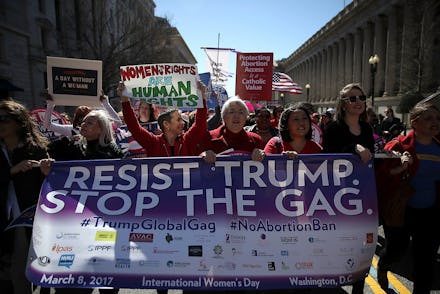The Trump administration is now trying to stop abortions internationally

In a continuation of its staunch anti-abortion position, the Trump administration is moving to expand policy that blocks federally funded international clinics from providing abortions. There's precedent for limiting which medical procedures federal funds can be used for, but it's a different level of interference to suppress abortion internationally through the power of funding. The move comes as an expansion of the Mexico City rule, which says that U.S. funding can't be used by foreign clinics to provide abortions; some reproductive rights advocates refer to it as a global gag rule, because those clinics are also generally barred from informing patients about the procedure. It is typically reinstated by Republican presidents — including President Trump on his first day in office — and rescinded by Democratic presidents.
Trump's move to expand on the Mexico City rule forces facilities to choose between providing abortions and receiving U.S. federal funding. The administration wants the gag rule to apply to facilities that have contracts with the U.S. government, not just grants or cooperative agreements, and wants clinics that take any U.S. health aid to be barred from providing abortion care — even if the American money is not going toward such care.
As a result, the Trump administration would force clinics to either forego funding that helps to provide check-ups, other prenatal care, family planning services, and medical testing if they want to provide abortion, or halt abortion care to continue other services. It's a catch-22 that limits the ability of local facilities to engage with their clients and denies a routine medical procedure — abortion — based on the political beliefs of the current administration.
By including clinics that have entered contracts with the U.S. federal government, the Trump administrating is forcing about 40% of facilities receiving aid to make this impossible decision. The Kaiser Family Foundation has found a direct link between restrictive policies and ability to provide services: "Foreign NGOs that declined U.S. funding as a result of the [global gag rule] — often key providers of women’s health services in these areas — had fewer resources to support family planning services, particularly contraceptives."
Money, of course, is one of the most effective ways to push people and organizations into accepting situations they would not have chosen for themselves, and Trump seems to understand this. Because of the all-or-nothing nature of the funding, proponents of access to abortion call this move "coercive." As Zara Ahmed wrote for the Guttmacher Institute, the global gag rule is "part of a calculated strategy of going after services and systems that benefit critical populations, including women, immigrants, the LGBTQ+ community, and many others."
The implications of this international policy are far-reaching. The rule puts added strain on already limited local municipal resources, often leads to an increase in pregnancies by young women thus limiting access to education, and even contributes to maternal morbidity and mortality. As Brian Ligomeka, the director of the Centre for Solutions Journalism in Malawi, put it: "The global gag rule in Malawi, it is a death sentence for poor, rural women."
It's not just families and communities that bear the brunt of reduced access to health care, either. Research has shown that access to reproductive health services — including abortion — is an effective tool for addressing climate change. Education for girls and access to family planning services "reduce carbon emissions more than any other solution identified," said Seema Jalan, executive director of the U.N. Foundation Universal Access Project, to the Sierra Club. Jalan continued, "When girls and women are stripped of their right to control their reproduction, we are also grinding to a halt some of the most effective interventions against climate change."